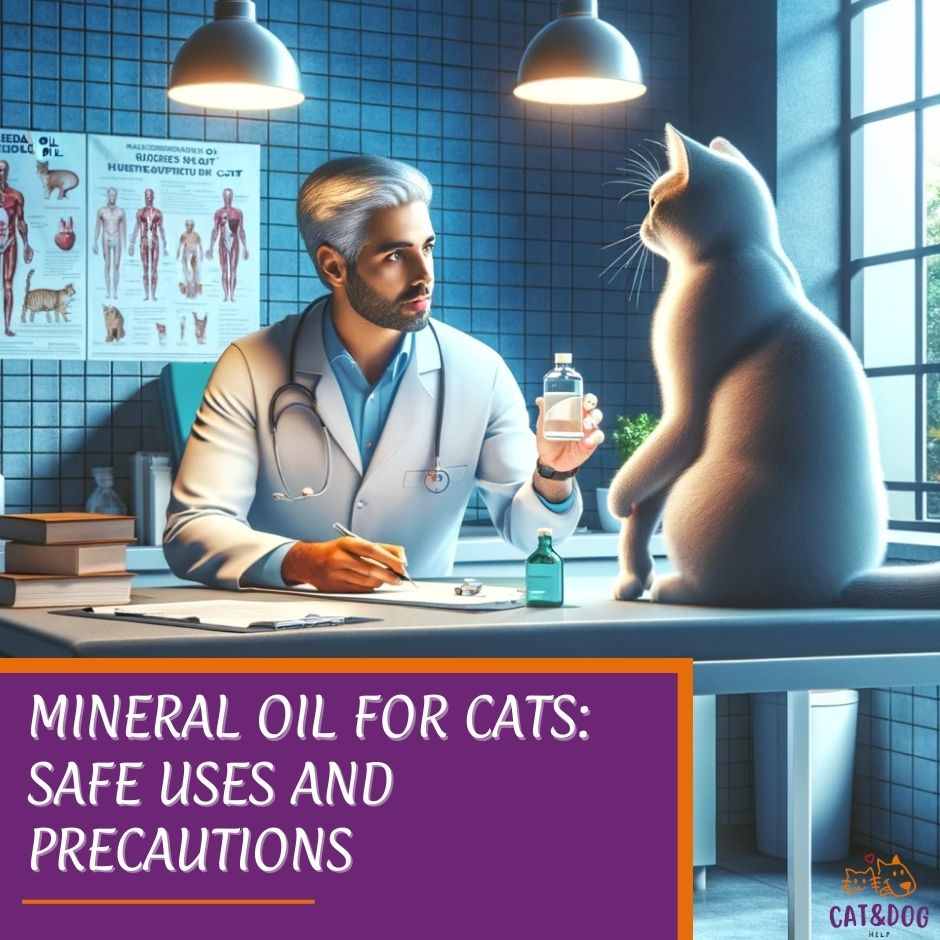If you’ve ever noticed your feline friend having trouble with their bowel movements, you might have come across the suggestion to use mineral oil.
This oil is commonly referenced as a treatment for relieving constipation in cats because of its lubricant laxative properties. Imagine it as a slippery slide helping everything along in your cat’s intestines. (1)
But before you decide to play vet, it’s crucial to arm yourself with the right information. There’s a sea of advice out there, and not all of it is created equal.
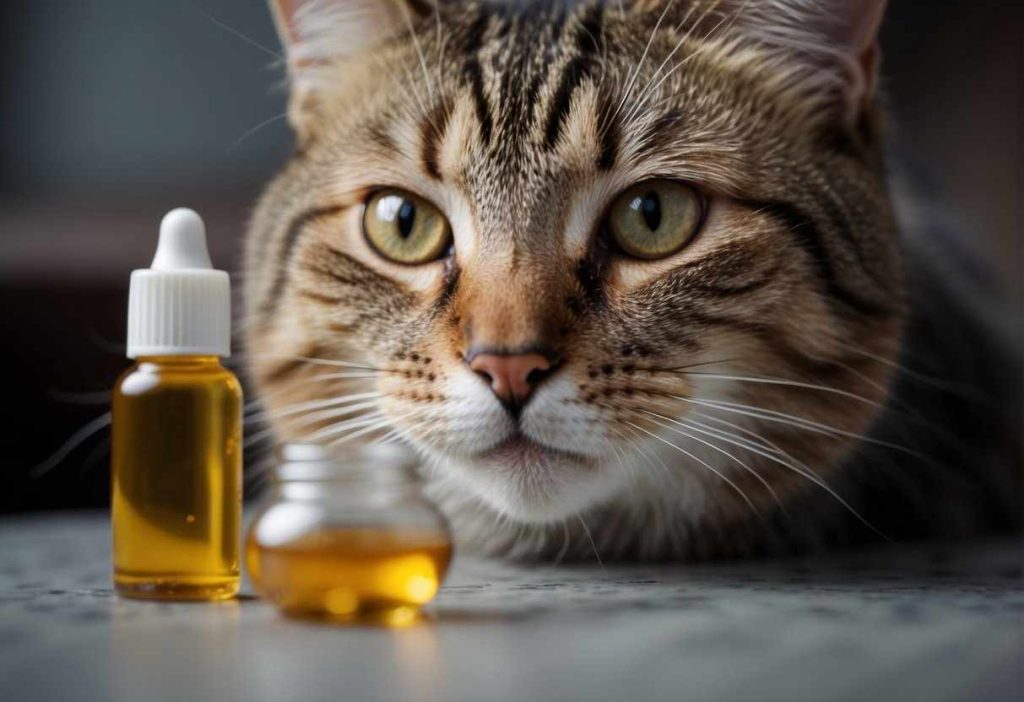
As a concerned pet parent, you’re likely looking for safe and effective ways to ease your cat’s discomfort. You might ask, “Is mineral oil the answer?” This is where things get a bit tricky.
While mineral oil can indeed be a useful tool in the cat constipation toolkit, it’s not without its risks. (2)
It’s like giving your cat a tiny umbrella in a downpour—it might provide some relief, but it’s no replacement for professional guidance.
Key Takeaways
- Mineral oil can treat constipation in cats by acting as a lubricant laxative.
- Consultation with a veterinarian is recommended for proper diagnosis and treatment.
Safe Usage of Mineral Oil for Cats
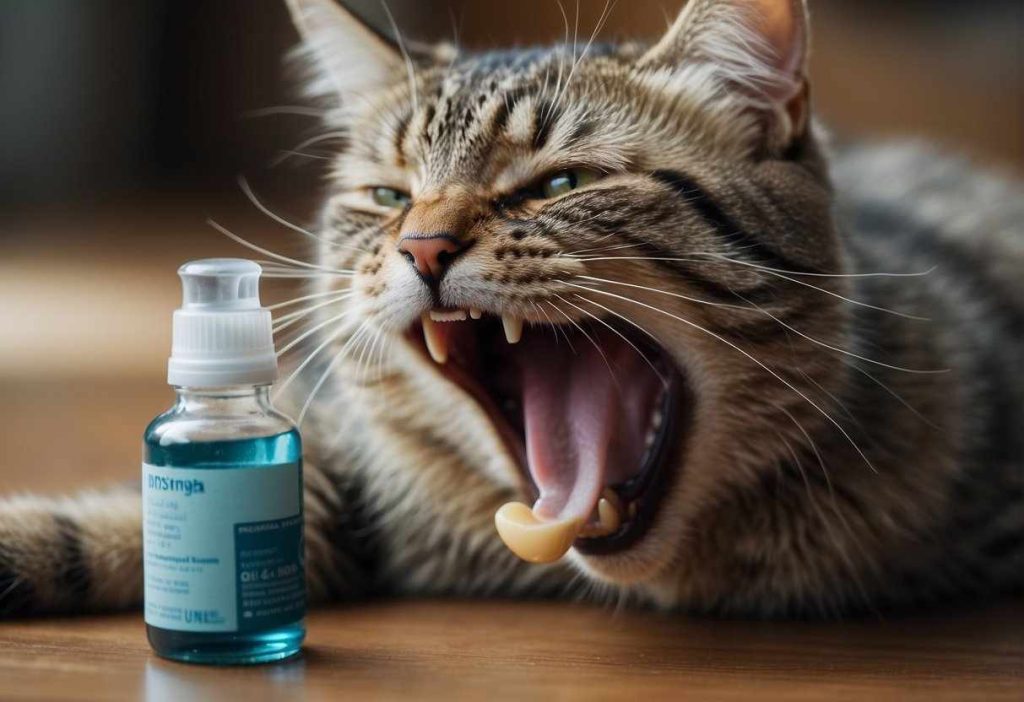
When your curious kitty is feeling a bit backed up, you might be considering mineral oil as a gentle nudge to get things moving. Here’s how you can help your feline friend safely.
Dosage Guidelines
First things first, you’ve got to get the dose just right. Go for half a teaspoon for starters, and only ratchet it up if your vet gives the thumbs-up—never exceeding a full teaspoon.
Like us, cats come in all sizes, so the small ones might need less. Age and health also play a part, so if you have a senior cat or one with health issues, a vet’s guidance is even more crucial.
Moreover, prolonged use of mineral oil without veterinary supervision can exacerbate or contribute to nutritional deficiencies in felines, as it may interfere with the absorption of essential nutrients and vitamins.
Administration Methods
Now, how do you get your cat to take this stuff? You could mix it with food, but only a bit to make sure they eat it all and get the full dose.
Some folks use a dropper or syringe (without a needle, of course) to gently squirt the oil into the side of the cat’s mouth. Remember, patience is key here!
Duration of Treatment
Stick to a short stint with mineral oil. It’s like the cat equivalent of a quick fix! Prolonged use could lead to vitamin deficiencies or more serious issues.
You can give your cat additional vitamins if your cat has a vitamin deficiency.
To sum up, when it comes to helping out our feline buddies with a little mineral oil, always play it safe. Check-in with your vet, measure carefully, ease into it, and don’t go making it a habit.
They’ll thank you with purrs and affectionate headbutts!
While exploring natural and over-the-counter options for easing your cat’s constipation, it’s also worth considering the various Vaseline uses in cats, such as its potential to soothe dry paws or aid in the prevention of hairballs, offering a gentle alternative to mineral oil
Understanding Mineral Oil for Cats
What Is Mineral Oil?
Mineral oil is essentially a colorless, odorless petroleum derivative.
It’s pretty mild stuff and is often used as a laxative due to its stool-softening qualities. Now, how exactly does it work?
When ingested, mineral oil coats the intestinal walls and stool, which helps increase moisture in the bowels. This can make it way easier for your cat to pass things through if they’re dealing with constipation.
The Role of Mineral Oil in Feline Health
When it comes to your kitty’s health, you want to be cautious, right? Mineral oil might sound like a simple solution for constipation or to keep those pesky hairballs at bay, but hold your horses!
Here’s a quick rundown of what you should consider:
- Benefits:
- It’s a lubricant that can soften stools, hence easing constipation.
- May help prevent the formation of hairballs by aiding their passage through the digestive system.
- Limitations:
- Electrolyte imbalance: Excessive use may lead to dehydration.
- Vitamin deficiency: It can interfere with the absorption of fat-soluble vitamins (A, D, E, and K). (3)
Before you dash to the pantry for your bottle of mineral oil, remember moderation is key, and not all remedies are one-size-fits-all. It’s typically a safe bet when used correctly, but it’s also not a cure-all.
You should absolutely chat with your vet before playing Dr. Dolittle. They’ll give you the scoop on how to use it without causing other issues like dehydration or vitamin deficiency.
There are several ways to prevent your feline friends from experiencing vitamin deficiency, namely by giving them food that contains these vitamins or vitamin supplements.
After all, you want your purring pal to be the picture of health, don’t you?
Potential Risks and Side Effects of Mineral Oil
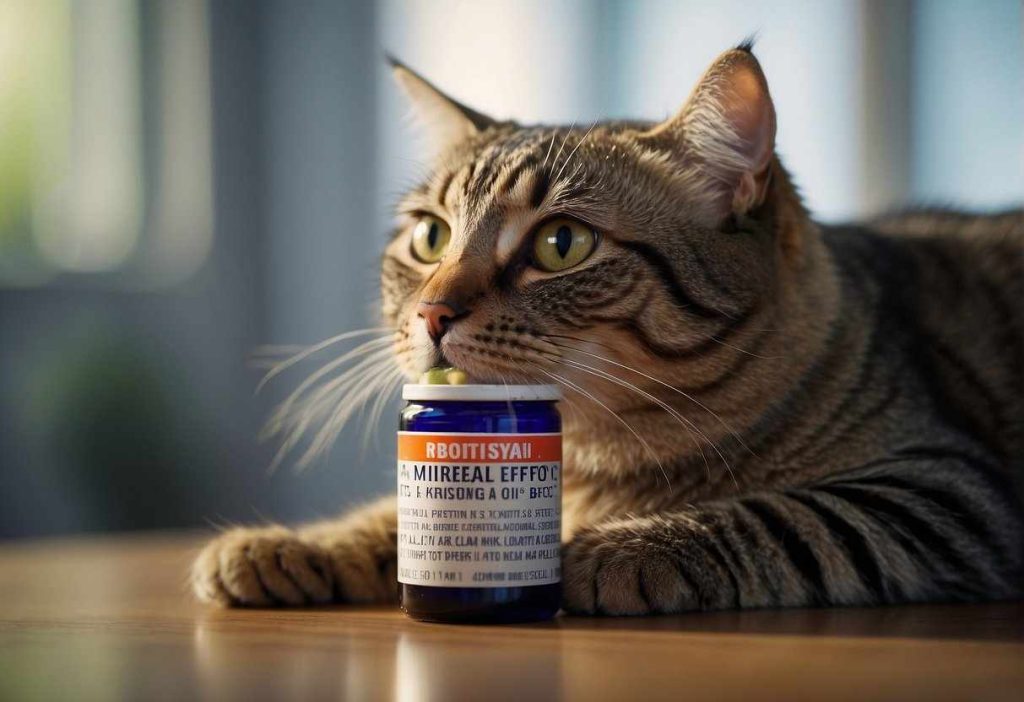
Common Side Effects
Have you ever noticed your fluffy friend acting a bit off after giving them mineral oil for constipation? Here’s a quick rundown of what you might see:
- Diarrhea: Yep, too much of a good thing can lead to a messy litter box situation.
- Vomiting: It’s not a pretty sight and a sign that your kitty’s tummy isn’t happy.
- Abdominal pain: Your cat may be more vocal or protective of their belly area.
Warning Signs to Watch For
Now, if you spot any of these worrying symptoms, it’s time to ring up your vet:
- Dehydration: Is your cat not as bouncy as usual or looking a little deflated? Pinch their skin gently; if it doesn’t spring back quickly, those hydration levels might be dropping.
- Electrolyte imbalances: Keep an eye out for odd behavior or muscle twitches, signs that vital salts in the body are out of whack.
- Lethargy: All cats love a good nap, but if it’s more snoozing and less play, that’s a red flag.
- Respiratory distress: This is serious; a cough or difficulty breathing means a vet visit, stat!
Long-Term Risks
Take a moment and think—have I been using mineral oil correctly? Improper use isn’t just a short-term blip on your cat’s health radar; it can lead to:
- Lung damage: If mineral oil gets inhaled, those delicate airways can suffer.
- Inflammation: Nobody likes feeling swollen and sore, especially not your cat.
Remember, while it might be tempting to reach for that bottle of mineral oil, consider chatting with your vet for safer alternatives to keep your cat’s digestive tract on the right track!
Alternatives to Mineral Oil
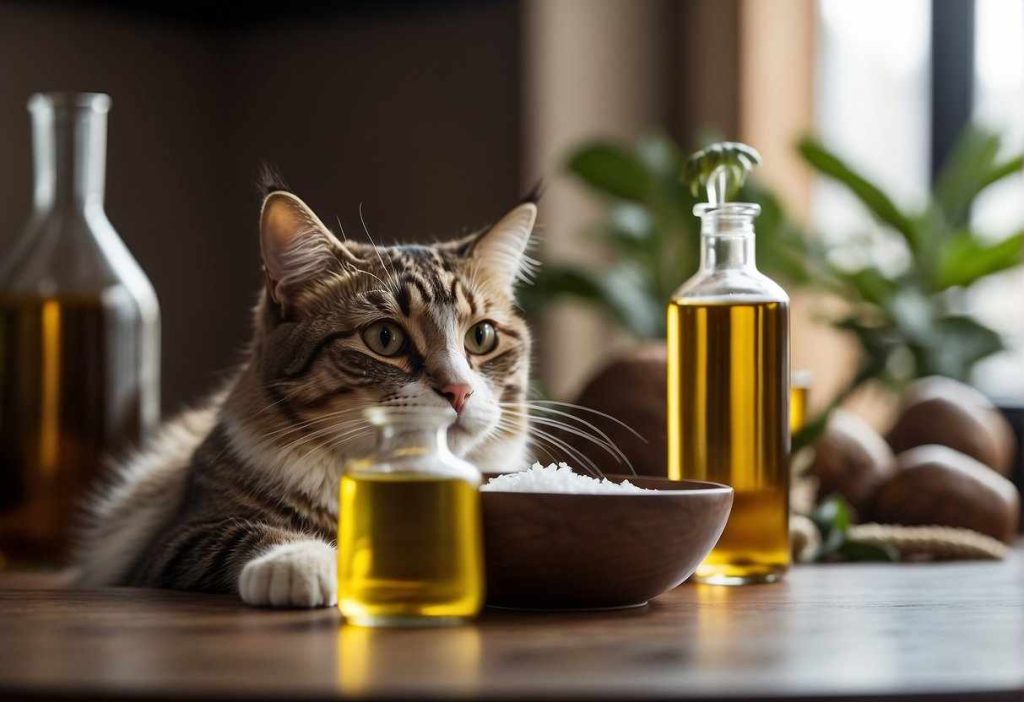
Natural Remedies for Constipation
Are you looking for a gentle nudge rather than a harsh push for your cat’s constipation? Let’s explore some kinder options that could do the trick:
- Pumpkin: A spoonful of canned pumpkin (not the spiced pie filling!) can add the necessary fiber to your cat’s diet. (4)
- Natural Oils: A dash of olive oil or coconut oil in their food might help to smooth things out.
Remember, too much of a good thing isn’t always better, so start small!
Over-the-Counter Options
Sometimes, you need something a little more specialized, but you still want to ditch the mineral oil. Here’s what you might find at your local pet store:
- Vet-recommended Laxatives: Certain brands create laxatives specifically designed for feline health. (5)
- Hairball Formulas: Specially formulated cat foods can prevent hairballs, a common culprit for constipation.
Before you grab anything off the shelf, though, it’s a good idea to chat with your vet for recommendations.
When to Consult a Veterinarian
You’re doing your best, but if you’ve tried the gentle approach and it’s not quite cutting it, a professional opinion is your next step. Here are scenarios where a vet should come into the picture:
- Chronic Constipation: It might be a sign of an underlying issue. (6)
- Dehydration: If you notice your cat isn’t drinking enough water, seek professional advice. (7)
- Uncharacteristic Symptoms: Lethargy, lack of appetite, or any untypical behavior warrants a check-up.
In essence, while you’re armed with alternatives, your vet is your partner on this journey.
Steering clear of mineral oil can be a simpler and safer route, and, with the right approach, you’ll have your cat feeling purr-fect in no time!
Veterinary Insights and Medical Advice
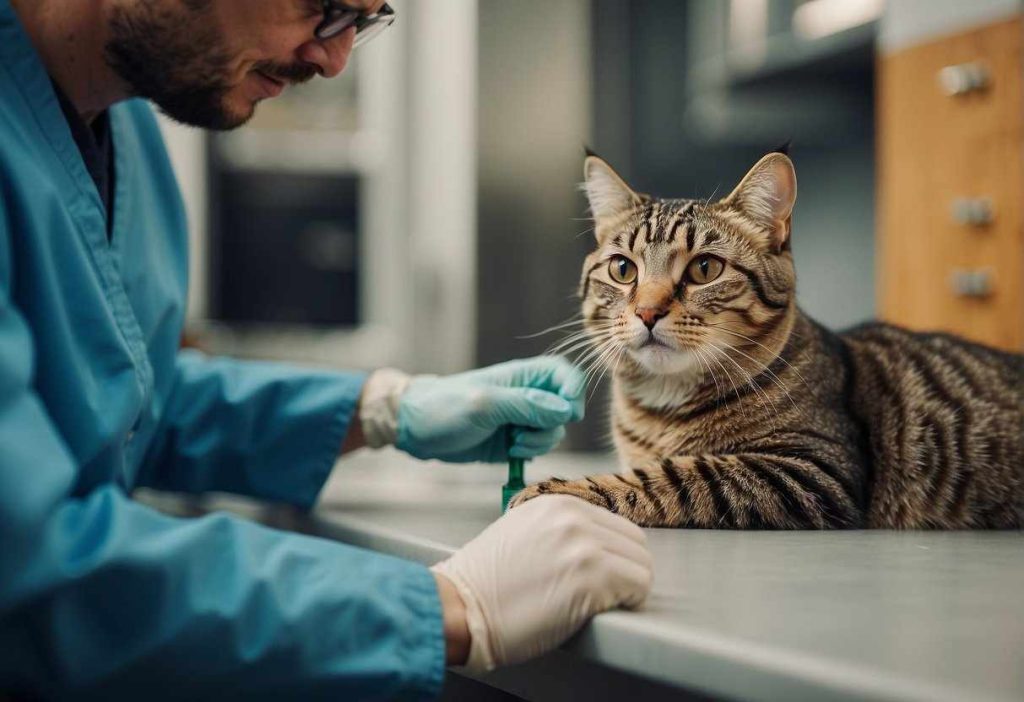
This oil coats the intestinal walls, reducing water absorption from the stool and making it easier for your cat to pass what needs to be passed.
There are several ways to keep your cat hydrated. Find cat hydration tips here.
Think of it as a personal water bottle for your cat’s bowel movements—keeping things hydrated for a smooth journey.
Now, I bet you’re asking, “Is it a cure-all for every kitty out there?” Hang on to that thought! While it’s a handy tool, mineral oil isn’t a one-size-fits-all answer.
Young kittens or senior cats with health issues need an extra-gentle touch. Small doses are key here—the right amount varies depending on their size and specific health needs.
Here’s a quick rundown:
- For small cats: a very modest dose
- For larger felines: slightly more, but it’s a delicate balance
Veterinarians often play detective, considering various health conditions that could be influenced by mineral oil.
They look at the whole picture, ensuring that this particular remedy won’t stir up any trouble in your cat’s unique system. And they’ve got the scoop on whether it’s a thumbs-up for your feline.
- For chronic kidney disease: proceed with caution
- For cats prone to hairballs: a potential aid under vet advice
Remember, while mineral oil can be helpful, it’s not kitty Kool-Aid! It’s important to have a chat with your vet first.
They’re the experts with all the insights—like a feline Sherlock Holmes, deciphering what’s best for your cat’s health.
When you’re considering mineral oil, their input is priceless, ensuring your cat stays purring and happy.
Practical Application and Real-World Examples
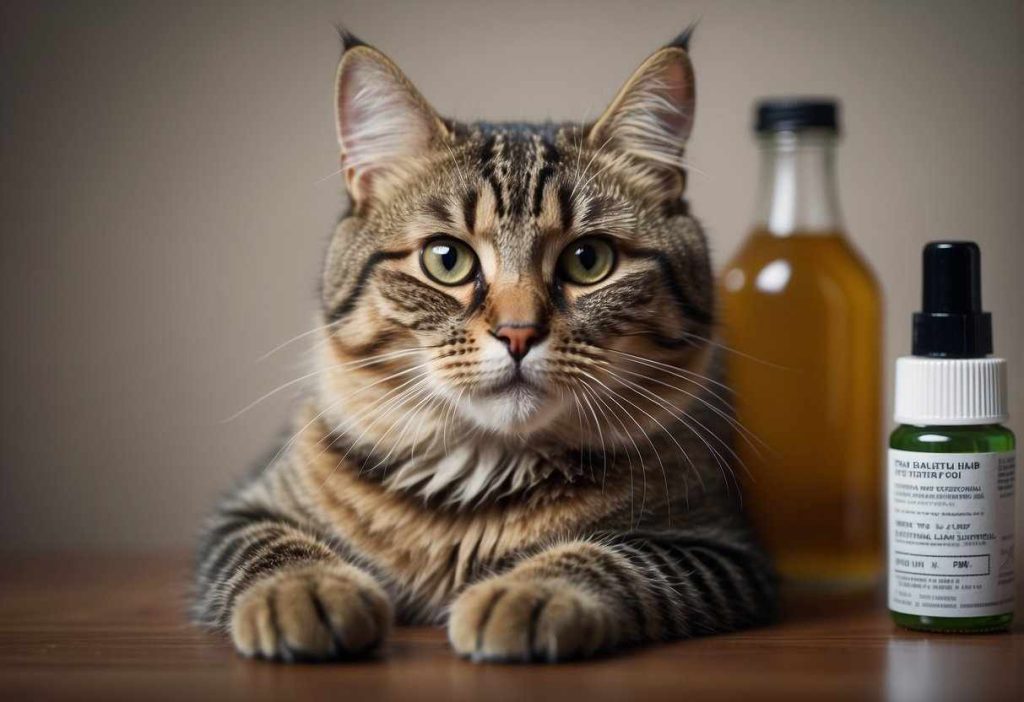
This clear, odorless lubricant works by softening stools and easing bowel movements. But how exactly has it been used in real-world scenarios? Let’s dig in with some genuine cases and feedback.
Case Study: Fluffy’s Fight with Constipation
A recent success story involves Fluffy, a 4-year-old Maine Coon.
Fluffy’s human, noticing her discomfort and difficulty during litter box visits, consulted their vet who recommended a small dose of mineral oil.
After administering the prescribed amount mixed in her food, Fluffy’s constipation resolved within 48 hours.
Feedback Roundup:
- Luna’s Leap: “Luna’s energy bounced back after two days of her mineral oil regimen—she’s back to her curious self!”
- Tom’s Triumph: “Never thought I’d be so grateful for mineral oil. It’s truly been a slippery solution for Tom’s digestive woes.”
Table 1 – Mineral Oil User Experiences
| Case | Cat Breed | Outcome | Owner Satisfaction |
|---|---|---|---|
| 1 | Maine Coon | Success | 5/5 |
| 2 | Siamese | Success | 4/5 |
Remember, while these anecdotes cheer on mineral oil, vet guidance is crucial. Every cat is unique, and what helped Fluffy or Luna might not be the purr-fect solution for yours.
Be sure to discuss dosage and potential side effects with your vet.
Curious how their fuzzy lives continued post-mineral oil? These cats returned to their playful, mischief-managing selves, clear of any digestive discomfort.
Just goes to show that sometimes, the best aid is one that’s been right under our noses—or in this case, paws—all along!
Quick Recap
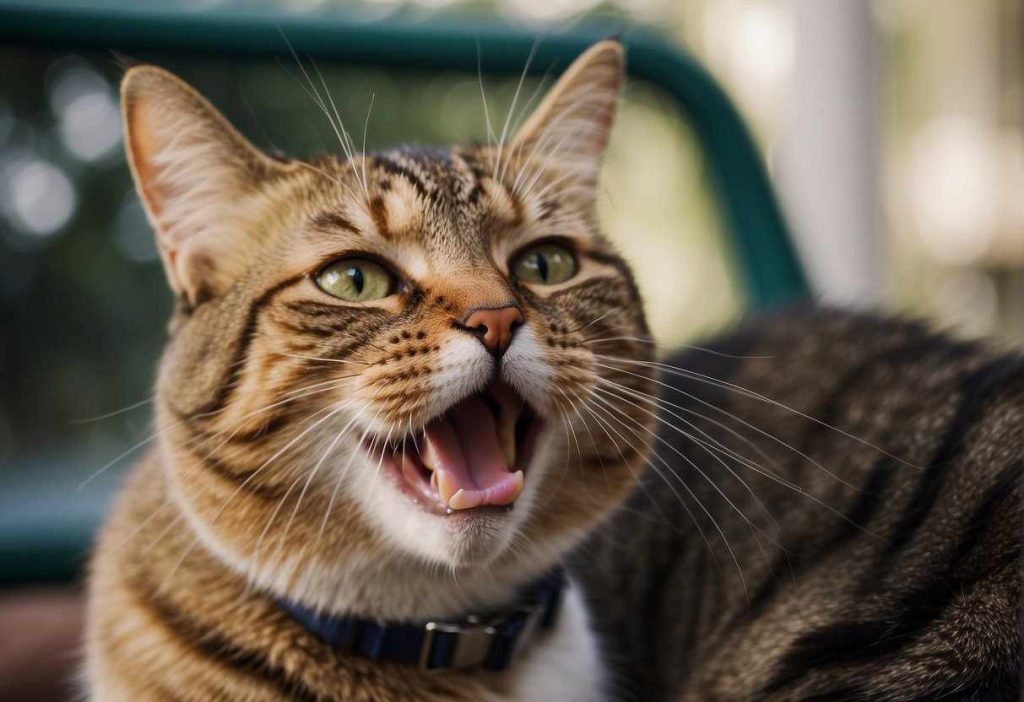
Remember, its purpose is to ease bowel movements by moisturizing the bowels and stools.
- When should you consider mineral oil? If your cat is a bit backed up. But keep it as a last resort, alright?
- Dosage is key. A mere teaspoon (tsp) is a good starting point, only for a short period, like 2-3 days.
Best practices for using mineral oil in cats:
- Consult your vet: Before you start, it’s always best to get a professional nod.
- Moderation matters: Stick to the recommended dosage to prevent nutrient absorption issues.
- Have a time limit: Don’t let the treatment linger on. A few days should be maximum.
Consider the side effects. It’s not all smooth sailing. Overuse can lead to health issues, so keep an eye out. Your cat’s health and safety is the priority, isn’t it?
Tips for a Healthy Kitty:
- Diet overhaul: Sometimes, a little tweak in the diet does the trick.
- Exercise: A playful romp can encourage natural bowel movements.
- Hydration: Keep that water bowl full. Hydration is crucial.
So, dear cat whisperer, use mineral oil judiciously, always put your kitty’s well-being first, and maintain those best practices for a happy, healthy feline friend!
Frequently Asked Questions
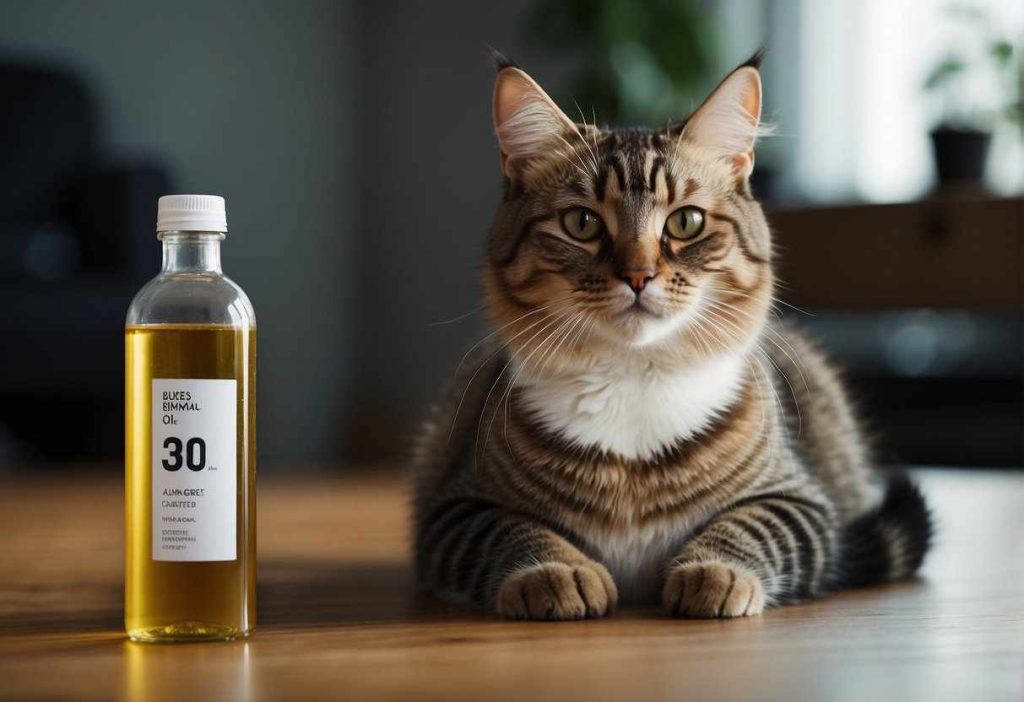
When it comes to your furry friend’s health, you probably have a bunch of questions.
Here, we’ll cover some essentials about mineral oil usage for your cat, ensuring you’re informed and ready to help your whiskered companion.
What is the recommended dosage of mineral oil for my cat?
The dosage of mineral oil for cats generally ranges from 1 to 4 milliliters per pound of body weight.
However, it’s important to get this right, so consult your vet for the precise amount for your cat.
How do I safely administer mineral oil to my cat?
Administering mineral oil directly to your cat can cause aspiration, which is dangerous.
Instead, mix the appropriate dose with food, or seek a vet’s guidance for safe administration.
Are there any side effects of using mineral oil in cats?
While normally safe in proper dosages, mineral oil can sometimes lead to vomiting, diarrhea, or abdominal pain. Always monitor your cat for any adverse reactions.
Can I use mineral oil for my kitten?
Kittens are sensitive little creatures. Before you consider giving mineral oil to a kitten, it’s crucial to talk to your vet, as the wrong move here could be particularly risky.
How long should I use mineral oil for my cat’s constipation?
Mineral oil is meant for short-term relief, not prolonged use.
If your cat’s constipation continues, there may be an underlying issue that needs addressing—best to chat with your vet.
What are natural alternatives to mineral oil for treating cat constipation?
Natural alternatives include increasing fiber intake through pumpkin or special cat food, and ensuring plenty of water for hydration.
These can help get things moving without the need for mineral oil.
Is mineral oil safe for cats with chronic health conditions?
If your cat has chronic health issues, mineral oil might not be the best choice.
This is where your vet becomes your best resource to find a safe, effective solution tailored to your cat’s specific needs.

